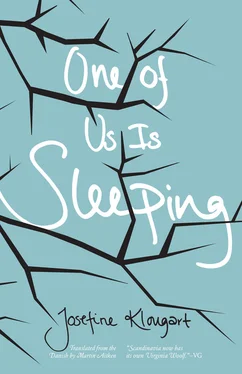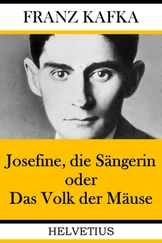To have a matter outstanding with life or not. To be interested — at all. Some kind of undirected enthusiasm. Something like that. Or, an enthusiasm bursting out in all directions. You ask yourself the right questions, and if you still keep lying there it’s because you want to, not because you don’t. The difference that makes.
HE PRESENTED HIS leaving as a sort of doubt. He had kind of begun, as he put it, to see other avenues.
Other people, she said.
He let her do all the dirty work. He had never been good at consequences. Or decisions. It was as if they frightened him.
Copenhagen, in their different apartments: it had lasted six months. She counted the days. Maybe it was the kind of thing you started doing.
Eight years.
They lay on the bed in her bedroom, but she did not stay there. She got up, he sat up with his hand to his mouth, watching her, his gaze was a greased cable trapped in the door that shut, and she locked herself in the bathroom.
It was a tiny room, with no depth. She had to sit with her legs on each side of the toilet, on the floor, her head leaned against the door; banging her head back against the door in a steady rhythm that made the soap tremble like a heart on the edge of the sink.
So this is what you do. After eight years. After eight years, you get up from the bed and leave the room quite composed, and yet de composed, without form; you pass through another room, lock yourself inside a bathroom and fall apart there. A person melted, sitting in that way, stiffened, banging her head against a door. Perhaps it is the only thing that can be done. Eight years, count the days, and slowly the talk takes place, beginning with a whisper on the other side of a door. Maybe that’s what it takes, maybe that’s the way it starts. That kind of moment that has all of time written into it: what has been, what is to come, what never will be, and, what never was. That, too.
What’s eight years.
When you’re a strangled voice behind a door. That kind of thought, a counting on the fingers, counting on the teeth, on the ribs and all the body’s bones. A rhythm coming through tissue, marrow and bone.
I MISS YOU, please come back.
SHE THINKS HE’S always disappointed by the woods, by nature in general.
She comes home to their apartment on Marselis Boulevard at nine, after her kilometers along the forest paths, and he groans like timber in the bed. Pulls her toward him, or else hates her. You’re cold, he says, and almost hates her there. Or else: You’re cold, he says, reaching out for her wrist, pulling her down under the duvet, drawing her close; a desire to warm her from within; you’re so cold, he says.
After a while she grew cunning: if we have sex now then it’s done, then maybe I’ll have the benefit of his guilty conscience the rest of the day. The kind of care you show an animal you’ve punished only to find out: there was no more water, they break through the fencing not to spite you, but because they’re thirsty. She told herself she could use her body to deceive him. To deceive her own body.
For a long time she thought she had achieved the latter.
For even longer she thought she had achieved the former. But then one evening in winter she realizes she has never deceived his body at all. He has known all along, abandoning her gradually, angry at her for having allowed it. Not for her having made him do it; that’s an idea you get, and maybe in some cases it’s the truth, but not in this one, that’s how she thought of it. He wasn’t angry with her for making him do it: for being an inferior person. What he was angry about — in view of her frailty or her backbone, or both, perhaps — was that she hadn’t stopped him. She was too fragile to accept such treatment, too strong to put up with it. Why did you put up with it.
His disappointment in her, in nature, too. Nature’s pale, and in that way self-embracing, voice. It not making itself known, not rousing you. Or perhaps just the fact that he had imagined something else, that it would do something else, something more for him, at least. That shock, of something utterly crucial.
Only it was a shock that never came, because basically you’re left out all the time. Exposed in the mountains, in the indifferent care of mountains.
THE MORNING IS savage, the sunrise a mockery of art, too exaggerated by far, these new shoes that shine, and train journeys home when everything is over. The audience has gone home. All there is left is this same slow train; alternately, a dismal hotel room. Seeing him search through the kitchen cupboards for bottles that do not exist, but that must exist, as he says, I know they do. I know.
She lets herself in with movements meticulously emptied of sound. She pulls off her clothes, the pile she makes of them looks like a dog resting in the feverish cold of an outhouse; flat as an empty skin in the basket under the coats, crates of orange soda in the corner, crates of empty beer bottles. She can make her body look like gray porcelain, the bones of her hands may be crushed by a handshake, her lungs collapse like moldering wickerwork with any embrace.
She shoves the pile with her foot, out of harm’s way, in case he wakes up and comes down before she gets the chance to do anything about it. And even then a thought occurs to her that sticks out in another direction; that her slackly dumping her clothes in that way might simply placate him, soften his annoyance, fear dressed up as annoyance or anger.
It was more like that.
An almost physical pain at waking up and seeing a new day rise up out of the sea , as it were, and she, coming home after running through the woods to the bathing jetty, after swimming, after, in that way having conspired with the sun, having risen up out of the sea — that was how he looked at it. That she was like vigor incarnate, as simple as that. All the serenity of her body on that account. All the things you cannot attain, only see; never have a part in, but wish for, year upon year. She bends down and messes up the pile so the various items are spread once more. An indication of her slackness, her rummaging about in the world.
Transilluminated, the rooms, on a morning like this.
You’re a detector, he says, meaning: I’ve read what you wrote, and if you could see everything so clearly, how come you, or we, have assembled all that, that whole idea of how it was. How I was. And you, you as well.
Indeed, she thinks. Indeed, I think, I suppose loving someone is like that. Half the time you’re frightened to death. The perspective. The shunting about, from seeing everything — to seeing nothing at all. That you can never go back and be met for the first time: seen. Differences outstanding, everywhere, piles of — well, what. Just piles.
THERE ARE TWO rooms.
There is him, sitting there, slowly ceasing to live; and there is her, banging her head back against a closed door. She is attempting to begin living. Later she thought it was the right thing to do. The fact that one of them had to say something, and that it could never be her.
He sits behind the door. Who knows what he feels. Perhaps he is ceasing to live. Death is there, on the other side of the door. Perhaps we see it all from above. The door between the two bodies is just a thin line someone has drawn in the picture. Later, this is what he told her, later he thought it was the biggest mistake he had ever made.
Maybe it’s that simple, too.
Two rooms.
She may never have loved him more than she did that night, when she thought there was no more love left inside her. When she thought that was that .
And the sound of her head, banging against the door.
Читать дальше












